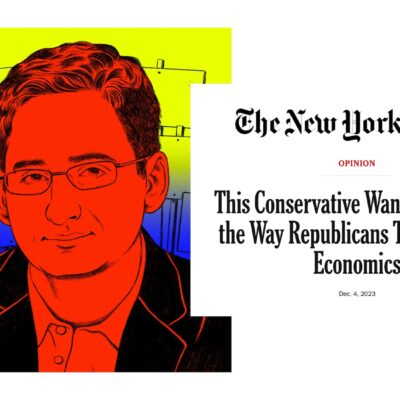

RECOMMENDED READING
The Republican Study Committee’s American Worker Task Force has just released a new report, “Reclaiming the American Dream: Proposals to Empower the Workers of Today and Tomorrow”. As such it represents another in a series of recent attempts to make the GOP the natural home for labor.
There’s some good ideas in the paper, notably in education where the authors place a renewed emphasis on Career and Technical Education (CTE programs) to enhance domestic skilled labor, concomitant with lessening the emphasis on the one-size-fits-all university degree orientation of education policy today. This comes in conjunction with advancing alternative education routes and German-style apprenticeship programs to best match workers to the skill sets required to maximize employment opportunities in the 21st century economy. The paper also introduces the intriguing idea of “allowing workers to design non-traditional careers that fit their needs”. In this context, it is especially gratifying to see the GOP attack the “independent contractor” loophole that many companies in the gig economy have used to undercut traditional employee benefits.
But to truly “refocus labor policy to unleash the American worker” as the paper advocates, the Republican Party needs to consider a reversal of many policies that have long been part of its orthodoxy, notably supply side tax policies heavily biased to society’s top earners, the ongoing support of “right to work” laws on the labor front, along with a tolerance of American manufacturers’ proclivity to outsource production to low-cost labor jurisdictions, all of which have eroded labor’s position.
Regarding manufacturing outsourcing, it should be conceded that both of America’s major parties have tolerated or accommodated this phenomenon to a degree. That said, in practical terms it’s hard to think about how we unleash the American worker if their workplace factories are consistently being shipped abroad.
That means that the state must take a more active role in national development which, given the GOP’s historic anti-statism (and market libertarianism), might prove problematic. But it’s not enough to ensure efficient, rent-free markets. Market dynamism must be harnessed to broader national developmentalism to bolster any attempt to “empower the workers of today and tomorrow”.
In theory, labor potentially is low hanging fruit for the Republicans. Donald Trump recognized that in the 2016 election when he explicitly made his pitch to the country’s disaffected blue-collar workers, who have largely supported the Democratic Party historically, in spite of the fact that they have seen their living standards eroded by decades of trade liberalization and other neoliberal policies that the Democrats supported. The president capitalized on a trend noted by Professors Herbert Kitschelt and Philipp Rehm, in a 2019 paper, “Secular Partisan Realignment in the United States: The Socioeconomic Reconfiguration of White Partisan Support since the New Deal Era”: namely, that over the past several decades, “low-income white voters without college degrees on the Democratic Party side, high-income white voters with degrees on the Republican side—have switched places.” Consequently, American political parties and their corresponding coalitions are now in flux to a degree not seen in decades.
The Democratic Party’s donor base is dominated by Wall Street and Silicon Valley; its policy priorities have increasingly reflected the preferences of those groups, often to the detriment of the party’s traditional working-class constituency (a big part of the Democratic Party’s coalition since the days of FDR). While Ronald Reagan’s presidency marked the first significant break with the post-WWII macroeconomic framework, both Bill Clinton and Barack Obama largely embraced Reagan’s market fundamentalist orientation. The upshot was a bipartisan consensus that had the effect of expanding the financialization of the US economy, while simultaneously accommodating the migration of manufacturing overseas. Taken in aggregate, this wrecked the foundations of the Rust Belt economy and eviscerated the power of private sector unions.
The Republicans also have a template overseas in the UK, where Boris Johnson’s Conservative Party secured a massive election victory last December, largely by virtue of winning a string of seats from the opposition Labour Party in the latter’s traditional working-class constituencies. To be sure, Brexit played a part here, but so did Johnson’s pledge to “level up” hitherto depressed regions in Britain’s North and Midlands, largely viewed as the losers in the globalization sweepstakes.
Can the Republicans replicate the British Tories’ electoral success in the US? The Taskforce Chairman of Reclaiming the American Dream, Rep. Andy Barr, suggests that the tax cuts and the regulatory reform enacted by President Trump have laid the foundations to recapture this important working-class constituency. Barr argues that the final piece of the puzzle (according to Real Clear Politics author, Philip Wegmann), is bolstering worker productivity.
There are two problems here. One is that the tax cuts Barr lauds have not yet resulted in a huge repatriation of corporate cash piles (allegedly parked overseas in the first place because of supposedly punitive U.S. corporate tax rates). Furthermore, overseas corporate tax arbitrage has continued unabated, according to Brad Setser of the Council of Foreign Relations. Even before the pandemically-induced depression, there were few signs of a renewed domestic business-led capital expenditure boom. Indeed, in specific sectors, Setser notes that Trump’s tax changes “created new incentives for the offshoring of pharmaceutical production and other high technology manufacturing jobs.” But if a tax package results in more outsourced manufacturing, how can benefits accrue to American workers?
Regarding productivity, if this is the final piece of the puzzle to secure a better future for American workers, as Barr maintains, the argument would have greater resonance if the workers’ wage gains were more explicitly linked to productivity gains. Unfortunately, that has not been the case for decades, as the economist Bill Mitchell has illustrated:
“The wage share was constant for a long time during the Post Second World period… So real wages grew in line with productivity growth which was the source of increasing living standards for workers.
The productivity growth provided the “room” in the distribution system for workers to enjoy a greater command over real production and thus higher living standards without threatening inflation.”
By the 1980s, however, attacks on trade unions intensified, thereby curbing the inability of workers to secure wage increases in line with productivity gains. Consequently, a gap between the two opened and continued to widen, the result being a diminution of living standards for American workers. In fairness, this is not a problem unique to the United States, but a common trend in most developed economies. However, if Republicans are serious about empowering workers today and tomorrow, they must develop policies to rectify this imbalance between labor and capital so as to enable workers in the future to better share the benefits of productivity gains and consume the fruits of their own labor.
Republicans have played a leading role in exacerbating this negotiating imbalance. Specifially, the enthusiastic support of “right to work” laws, state laws that prohibit union security agreements between employers and labor unions, have historically been enthusiastically embraced by many leading Republicans . But others in the GOP, notably Senators Marco Rubio and Josh Hawley, are trying to move the party in a more pro-worker direction, championing a new kind of blue-collar conservatism that is supportive of unions and policies that emphasize the “dignity of work.” In a recent piece for First Things, for example, Senator Rubio cites Catholic social thought in support of labor unions.
Where industries are sufficiently large, and the workforce sufficiently unionized, (such as the automobile sector), a 1970s style “Tripartite model” – which featured the collaboration of labor, business, and government in the national interest – could be revived, along with contracts that specifically link productivity gains to wage increases. A good historic example was the Treaty of Detroit, a landmark agreement established between General Motors and the United Auto Workers (UAW) in 1950 that, according to David Moberg,
“…helped create mass prosperity and growing equality in America over the next two decades by setting a standard for other unions that even many non-union employers felt pressure to approximate. Workers shared in rising productivity, and unions shifted to employers many of the risks that come from life in a capitalist economy.”
As Michael Lind has argued: “The tripartite approach to what used to be called ‘industrial relations’ has old and deep roots in American politics and policy”. Indeed, such roots are fully bipartisan: Calvin Coolidge was as favorably predisposed in principle to trade unions or collective bargaining in the private sector as FDR (although both were equally opposed to extending unionization rights to the public sector).
For fragmented “sweatshop” industries where a “big three tripartite” model among government, unions and big business is inapplicable, governments can substitute unionized wage boards that were created in the early 20th century in the UK and copied in the United States. New York Governor Andrew Cuomo, for example, has used a state wage board to raise the fast-food wage. Wage boards with tripartite government-employer-worker representation can be used by U.S. states in low-wage sectors that can’t be removed to another state or country (construction, health care, nursing, restaurants). They should have power over hours and working conditions, not just wages.
But in the context of an economy that has become largely de-unionized, there is only so much one can achieve through a resurrected tripartism, absent creating new structures to achieve the same historic role as labor unions. Here, Congressman Ted Budd (who served on the Republican study committee), has invoked the example of Germany, which “has had significant success with work councils, which have benefited both their companies and their workers. Our task force supports changing the law to allow new and different labor-management models to emerge.”
This might include Germany’s “co-determinism” model, which legally enshrines the right of “workers at large companies [to] elect up to half the members of supervisory boards, which make high-level strategic decisions, including how to invest profits and whom to hire for senior management positions. Workers also elect representatives to works councils, the ‘shop-floor’ organizations that deal with day-to-day issues such as overtime pay, major layoffs and monitoring and evaluation”, writes the economist, Susan Holmberg. Until recently, this has been an idea associated with Democrats, such as Senator Elizabeth Warren, but given the GOP task force’s explicit embrace of work councils, there is no reason not to appropriate some variant of Warren’s idea. Bipartisan provenance also gives greater chance of legislative enactment and entrenchment, much as Germany’s co-determinism is now broadly accepted across that country’s political spectrum.
Every election, politicians from both parties make the requisite pitch to American workers, who count themselves amongst the biggest losers from globalization and free trade. The 2016 race showed that this a group that is now up for grabs. For either party to entrench workers as part of a new governing coalition in the future, they will need to make further efforts to develop policies that reflect labor’s broad interests, not just those of the parties’ respective donor classes. It is indeed in labor’s interests to see both parties aggressively competing to secure that support so that neither simply assumes working class support and then ignores the American worker after the election. While it may not have everything, the GOP’s American Worker Task Force does represents an admirable step to secure workers’ support by walking the walk with real policy meat that addresses their concerns. After all, a prosperous American economy that serves all peoples’ interests, as opposed to the privileged few, is more likely to create a happier and more tolerant polity.
Recommended Reading
Refocusing Labor Policy to Unleash the American Worker
American workers are the backbone of this country. In the wake of the economic devastation caused by the COVID-19 pandemic, it is more important than ever to remove barriers burdening the American worker. On Capitol Hill, the Republican Study Committee’s American Worker Task Force has proposed bold new solutions that would empower our nation’s workers to face today’s challenges as well as tomorrow’s.
This Conservative Wants to Change the Way Republicans Think About Economics
In an extended New York Times interview, Oren Cass discusses the importance of labor to conservative economics.
Policy Brief: Workforce Training Grant
Congress should create a Workforce Training Grant—a $10,000-per-year grant to employers for each trainee engaged in on-the-job training.













